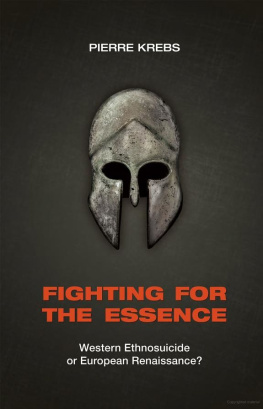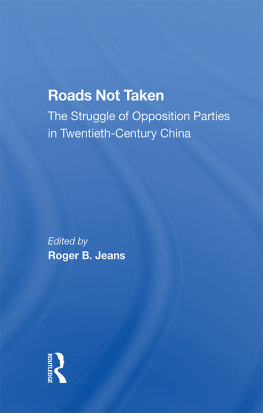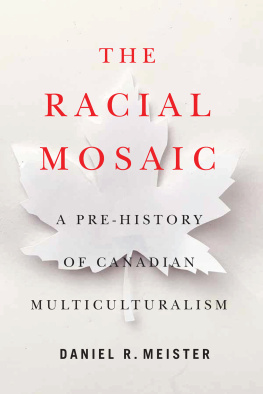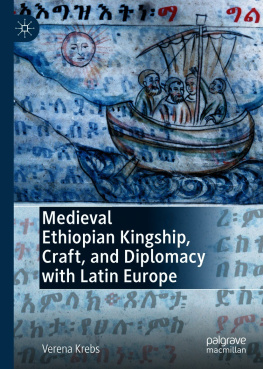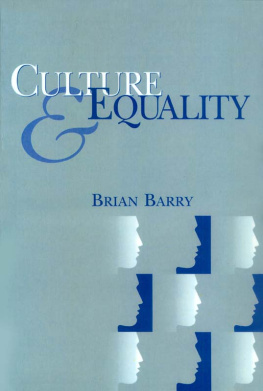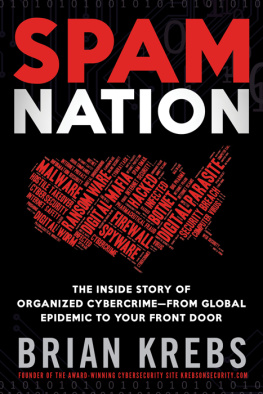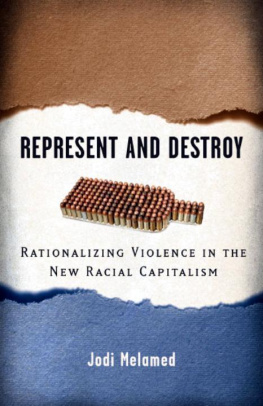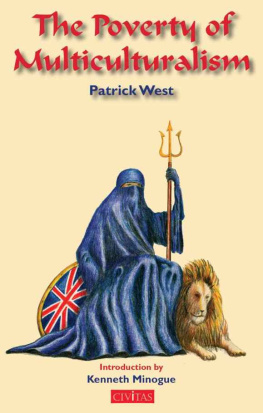Fighting for the Essence
Pierre Krebs
Fighting for the Essence
Western Ethnosuicide or European Renaissance?
Translated by Dr. Alexander Jacob
ARKTOS
London
Original edition, Im Kampf um das Wesen , published in 1997 by Thule-Seminar, Kassel, Germany.
French edition, Combat pour lessentiel , published in 2002 by Paneuropa, Madrid, Spain.
First English edition published in 2012 by Arktos Media Ltd.
Copyright to the English edition 2012 by Arktos Media Ltd.
All rights reserved. No part of this book may be reproduced or utilised in any form or by any means (whether electronic or mechanical), including photocopying, recording or by any information storage and retrieval system, without
permission in writing from the publisher.
Printed in the United Kingdom.
isbn 978-1-907166-59-4
BIC classification: Social & political philosophy (HPS);
Conservatism and right-of-centre democratic ideologies (JPFM);
Nationalism (JPFN)
Translation: Dr. Alexander Jacob
Editor: John B. Morgan
Co-Editor: Matthew Peters
Cover Design: Tor Westman
Layout: Daniel Friberg
ARKTOS MEDIA LTD
www.arktos.com
One of them undoubtedly did not know the other. And the other, surely, could not have known much about the first. The two of them fought against each other. The first, unknown to himself, a Guelph and increasingly skeptical, in the camp of Judaeo-Christian Western civilisation, even if everything separated him from it: spirit, sensibility, character. The other, an ever-more convinced Ghibelline, fought in the other camp of Europe. Both were soldiers, both fell, the first in mid-air off Corsica, the second in Russia. But both were also, and above all, visionary poets who suffered the same aversions to uniformity, who proclaimed the same rejection of egalitarianism, who were nourished on the same values of Promethean Europe, who shared the same convictions of the right of peoples to difference.
The first was called Antoine de Saint-Exupry, the other was called Kurt Eggers.
I dedicate this book to these two figures of Europe and I gift the hope of my will to their common belief in Europe. May the parties, flags and symbols cease to separate us at the time of identitarianism, when we are conscious of the blood that unites us.
The most significant event in the life of a people whether or not we detect a connection with external vicissitudes is the emergence of the mode of thought that is peculiar to it, as if designed for it from the beginning of time, by which it is henceforward distinguishable in the worlds history.
Walter F. Otto, The Homeric Gods , p. 10
Table of Contents
A Note from the Editor
U nless otherwise indicated, the footnotes to the text were included by the author himself for the French edition of the work, from which this translation was made. Additional footnotes which were added by me for reference are so marked. Where sources in other languages have been cited, I have attempted to replace them with existing English-language editions. Citations to works for which I could locate no translation are retained in their original language. Web site addresses for on-line sources were verified as accurate and available during November 2011.
The original German edition of this book was published in 1997. This translation was produced from the French edition, which was published in 2001, per Dr. Krebs wishes. The reader should remember this context whenever Dr. Krebs refers events which were contemporary at the time.
I would like to thank Dr. Tomislav Sunic, who kindly contributed an original Preface for this volume on extremely short notice. I would also like to extend my appreciation to Matthew Peters, for his genuinely eagle-eyed proofreading work.
JOHN B. MORGAN IV
Mumbai, India
December 2011
Foreword by Dr. Tomislav Sunic: Titans are in Town
T here are books that are timely, but there are also books whose time is yet to come. The time has come to urgently read and reread Pierre Krebs book Fighting for the Essence , which was first published in the German and French languages in 1997 and 2001, respectively. This excellent English translation, which was made by Dr. Alexander Jacob, has finally seen the light of day.
Dr. Pierre Krebs is a Franco-German philosopher and writer who, along with Alain de Benoist, was one of the founders of the think tank which came to be known in the late 1970s under the French acronym GRECE, in Kassel, Germany, and which continues to carry out research today. He is also one of the leading figures of the Neue Kultur (New Culture) movement. Krebs is an indefatigable fighter for the cause of the European peoples. Among his books, one must also single out Das unvergngliche Erbe: Alternativen zum Prinzip der Gleichheit (The Immortal Heritage: Alternatives to the Principle of Equality) in 1981 and Mut zur Identitt (The Courage of Identity) in 1988.
For some putative White nationalists or traditionalists, reared within the culture of Christendom, this book may serve as an introduction to an alternative worldview. But this book also needs to be read by every person who is searching for ways to extricate himself from the modern multicultural and politically-correct verbiage spewed out by the so-called free Western media and its tenure-guarding scribes in academia. Granted, the book may not be an easy read for everybody in view of the fact that it presupposes at least cursory knowledge of the ancient pre-Christian mindset or, short of that, some insight into the significance of Nietzsches prose.
Krebs book actually urges the reader to decolonise his mindset, purging from it the images and concepts that have been contaminating White European brains over the last two millennia, and which resulted in a distorted perception of objective reality and a perverse form of White identity. In a word, this book can be described as an epistemological primer for those looking not just for the reasons behind the ongoing decadence in Europe and America, but also for those interested in the root causes of that decadence. Before combating the vileness of the present system, a modern man or woman of European extraction must make an effort to critically examine the origins of the founding myths of that system. Why waste time on futile talk about the dying White race, the troubles of Europe, the dictatorship of the ideology of comfort, or the immigration disaster if the heart of the problem is wilfully ignored? In doing so, one only cures the symptoms of the disease while failing to address its causes.
Even if a reader finds the answer to the problem, the cure may not be that simple. For even if his methodological analysis is fairly successful, the endless ranting and ravings, so common among many so-called White nationalists or others which attempt to place the blame squarely on the shoulders of others, who allegedly pollute academia and public discourse, must be tossed aside and replaced by more sober and serious analyses. To address these problems, we must first solve the issues that lie within our own cultural baggage. To put it in plain English, the house needs to be built up from its foundations, not down from its roof.
This book is important because it advises the reader about how to decipher the causes and consequences of our decadent age. Being himself a disciple of European heavyweights such as Homer, Nietzsche, and Heidegger to name only a few Krebs correctly traces the root of the problem of White racial decay and cultural decadence not to liberalism and multiculturalism, but to the Judaeo-Christian tradition. Above all, Krebs focuses on the destructive forms of the monotheistic Judaeo-Christian mindset which prevails among both the so-called Leftist and Right-wing intellectuals and their respective disciples. In fact, by using quotes from and commentaries concerning many important, albeit deliberately ignored European scholars, Krebs demonstrates that all political concepts that we take for granted today are basically modified ideas, myths, legends and impostures that originated in the Middle East and that are now making headway into our secular, godless society.

